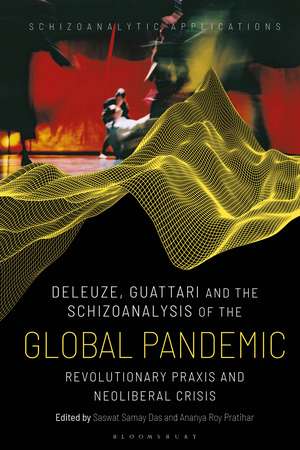Deleuze, Guattari and the Schizoanalysis of the Global Pandemic: Revolutionary Praxis and Neoliberal Crisis: Schizoanalytic Applications
Editat de Saswat Samay Das, Ananya Roy Pratiharen Limba Engleză Hardback – 17 mai 2023
Preț: 510.10 lei
Preț vechi: 731.00 lei
-30% Nou
Puncte Express: 765
Preț estimativ în valută:
97.61€ • 102.17$ • 81.24£
97.61€ • 102.17$ • 81.24£
Carte tipărită la comandă
Livrare economică 31 martie-14 aprilie
Preluare comenzi: 021 569.72.76
Specificații
ISBN-13: 9781350276918
ISBN-10: 135027691X
Pagini: 224
Dimensiuni: 156 x 234 mm
Greutate: 0.49 kg
Editura: Bloomsbury Publishing
Colecția Bloomsbury Academic
Seria Schizoanalytic Applications
Locul publicării:London, United Kingdom
ISBN-10: 135027691X
Pagini: 224
Dimensiuni: 156 x 234 mm
Greutate: 0.49 kg
Editura: Bloomsbury Publishing
Colecția Bloomsbury Academic
Seria Schizoanalytic Applications
Locul publicării:London, United Kingdom
Caracteristici
Original contributions on the pandemic and its practical-theoretical implications from leading scholars of Deleuze and Guattari
Notă biografică
Saswat Samay Das is Associate Professor at the Indian Institute of Technology, Kharagpur, India. Ananya Roy Pratihar is Assistant Professor at the Institute of Management and Information Science, Bhubaneswar, India.
Cuprins
Introduction, Paul Patton (Wuhan University, China)1. Toward an Epidemiology of Morals, Clayton Crockett (University of Central Arkansas, USA)2. Beyond Control: Technology, Post-Faciality and the Dance of the Abstract, Brad Evans (University of Bath, UK), Chantal Meza (University of Bath, UK)3. Obscura Sacrificia: COVID and Neoliberalism, Brent Adkins (Roanoke College, USA)4. Pandemic, Biopolitics and the Task of Thinking: Between Heidegger and Deleuze, See Sin Heng Tony (National University of Singapore, Singapore)5. Post-Covid Communities: Immanent Engagements and Intersectional Transversality, Janae Sholtz (Alvernia University, USA)6. The Limits of Perception: Knights of Narcotics, Nonhuman Aesthetics and the Psychedelic Reviva, Patricia Pisters (University of Amsterdam, Netherlands) 7. Deleuze and Guattari, The Pandemic, the Trump Presidency and the Schizo-Analytic Essay Machine, Damian Ward Hey (Molloy College, USA)8. Regimes of Exclusion and Control: Politics of Modern Space and Its Role in the Pandemics, Emine Gorgul (Istanbul Technical University, Turkey)9. Deleuze (and Guattari) and the Concept of Contaminated People, Virgilio Rivas (Polytechnic University of the Philippines, Philippines) 10. Disease as Terror: The New Global Conflict, Kyle Novak (University of Guelph, Canada)11. The Ethics of Paranoia: How to Become Worthy of COVID-19?, Jernej Makrelj (Cardiff University, UK) 12.Thinking the Covid-19 as an Event: A Physical And Spiritual Illness in the Post-Truth Era, Francisco J. Alcalá (University of Barcelona, Spain)13. A Cartography of Mutual Aid Groups in Brighton: Ethics of Care and Sustainability, Elizabeth Vasileva (Anglia Ruskin University, UK)Index
Recenzii
Using the philosophy of Deleuze and Guattari, this collection of chapters grapples, in various ways, with what it means to engage a revolutionary praxis in the face of a global pandemic, and how to do so without falling prey to our little Oedipuses, our own dogmatic images of thought.
Deleuze, Guattari and the Schizoanalysis of the Global Pandemic is a timely book which gathers together a truly international set of perspectives on our current social, political and environmental milieu.
Does the pandemic signal the rise of new forms of technological surveillance, capitalist transhumanism, and forced medical interventions? Or does the pandemic inspire us to create positive transversal communities and mutual aid groups? This book stages a lively debate among Deleuze scholars about the pandemic and what comes next.
Deleuze, Guattari and the Schizoanalysis of the Global Pandemic is a timely book which gathers together a truly international set of perspectives on our current social, political and environmental milieu.
Does the pandemic signal the rise of new forms of technological surveillance, capitalist transhumanism, and forced medical interventions? Or does the pandemic inspire us to create positive transversal communities and mutual aid groups? This book stages a lively debate among Deleuze scholars about the pandemic and what comes next.









